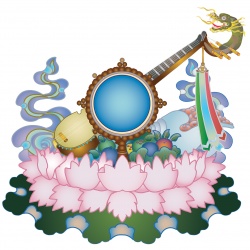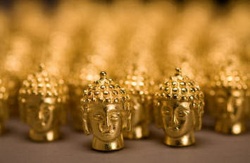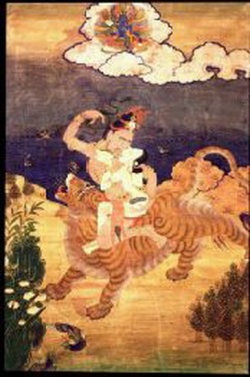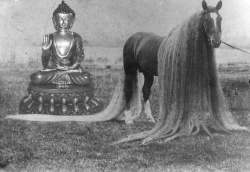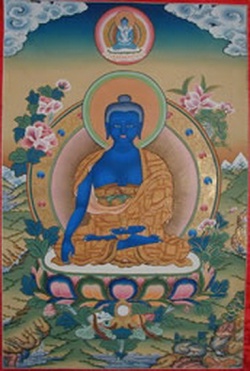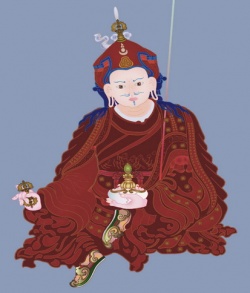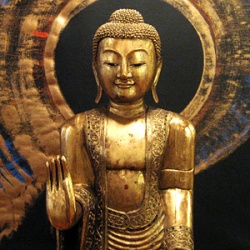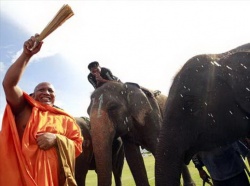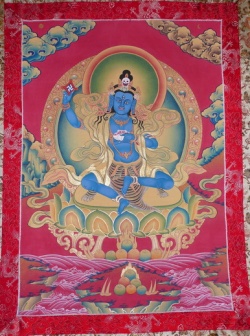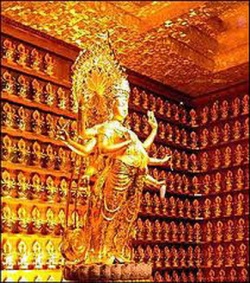Difference between revisions of "The Gospel of Buddha:Chapter 28: Yasodhara"
(Created page with "{{DisplayImages|1165|1738|451|1788|1971|801|2032|67|1079|619|1113|1762|175|1707|49}} On the next morning the Buddha took his bowl<br/> and set out to beg his food. [1]<br/> <b...") |
|||
| Line 1: | Line 1: | ||
{{DisplayImages|1165|1738|451|1788|1971|801|2032|67|1079|619|1113|1762|175|1707|49}} | {{DisplayImages|1165|1738|451|1788|1971|801|2032|67|1079|619|1113|1762|175|1707|49}} | ||
| − | On the next morning the Buddha took his bowl<br/> | + | On the next morning the [[Buddha]] took his [[bowl]]<br/> |
| − | and set out to beg his food. [1]<br/> | + | and set out to beg his [[food]]. [1]<br/> |
<br/> | <br/> | ||
And the news spread abroad.<br/> | And the news spread abroad.<br/> | ||
| − | "Prince Siddhattha is going from house to house<br/> | + | "{{Wiki|Prince}} [[Siddhattha]] is going from house to house<br/> |
| − | to receive alms in the city where he used to ride<br/> | + | to receive [[alms]] in the city where he used to ride<br/> |
in a chariot attended by his retinue.<br/> | in a chariot attended by his retinue.<br/> | ||
His robe is like a red clod,<br/> | His robe is like a red clod,<br/> | ||
| − | and he holds in his hand an earthen bowl." [2]<br/> | + | and he holds in his hand an earthen [[bowl]]." [2]<br/> |
<br/> | <br/> | ||
On hearing the strange rummour,<br/> | On hearing the strange rummour,<br/> | ||
| − | the king went forth in great haste<br/> | + | the [[king]] went forth in great haste<br/> |
and when he met his son he exclaimed:<br/> | and when he met his son he exclaimed:<br/> | ||
"Why dost thou thus disgrace me?<br/> | "Why dost thou thus disgrace me?<br/> | ||
Knowest thou not that I can easily supply<br/> | Knowest thou not that I can easily supply<br/> | ||
| − | thee and thy bhikkhus with food?" [3]<br/> | + | thee and thy [[bhikkhus]] with [[food]]?" [3]<br/> |
<br/> | <br/> | ||
| − | And the Buddha replied:<br/> | + | And the [[Buddha]] replied:<br/> |
| − | "It is the custom of my race." [4]<br/> | + | "It is the {{Wiki|custom}} of my race." [4]<br/> |
<br/> | <br/> | ||
| − | But the king said: "How can this be?<br/> | + | But the [[king]] said: "How can this be?<br/> |
| − | Thou art descendant from kings,<br/> | + | Thou [[art]] descendant from [[kings]],<br/> |
| − | and not one of them ever begged for food." [5]<br/> | + | and not one of them ever begged for [[food]]." [5]<br/> |
<br/> | <br/> | ||
| − | "O great king," rejoined the Buddha,<br/> | + | "O great [[king]]," rejoined the [[Buddha]],<br/> |
| − | "thou and thy race may claim descent from kings;<br/> | + | "thou and thy race may claim descent from [[kings]];<br/> |
| − | my descent is from the Buddhas of old.<br/> | + | my descent is from the [[Buddhas]] of old.<br/> |
| − | They, begging their food, lived on alms." [6]<br/> | + | They, begging their [[food]], lived on [[alms]]." [6]<br/> |
<br/> | <br/> | ||
| − | The king made no reply, and the Blessed One continued:<br/> | + | The [[king]] made no reply, and the [[Blessed One]] continued:<br/> |
| − | "It is customary, O king, when one has found a hidden treasure,<br/> | + | "It is customary, O [[king]], when one has found a [[hidden treasure]],<br/> |
| − | for him to make an offering of the most precious jewel to his father.<br/> | + | for him to make an [[offering]] of the most [[precious]] [[jewel]] to his father.<br/> |
| − | Suffer me, therefore, to open this treasure of mine<br/> | + | [[Suffer]] me, therefore, to open this [[treasure]] of mine<br/> |
| − | which is the Dharma, and accept from me this gem:" [7]<br/> | + | which is the [[Dharma]], and accept from me this [[gem]]:" [7]<br/> |
<br/> | <br/> | ||
| − | And the Blessed One recited the following stanza:<br/> | + | And the [[Blessed One]] recited the following [[stanza]]:<br/> |
<br/> | <br/> | ||
| − | "Rise from dreams and loiter not<br/> | + | "Rise from [[dreams]] and loiter not<br/> |
| − | Open to truth thy mind.<br/> | + | Open to [[truth]] thy [[mind]].<br/> |
| − | Practise righteousness and thou<br/> | + | Practise [[righteousness]] and thou<br/> |
| − | Eternal bliss shalt find." [8]<br/> | + | [[Eternal]] [[bliss]] shalt find." [8]<br/> |
<br/> | <br/> | ||
| − | Then the king conducted the prince into the palace,<br/> | + | Then the [[king]] conducted the {{Wiki|prince}} into the palace,<br/> |
| − | and the ministers and all the members of the royal family greeted him with great reverence,<br/> | + | and the ministers and all the members of the {{Wiki|royal}} family greeted him with great reverence,<br/> |
| − | but Yasodhara, the mother of Rahula, did not make her appearance.<br/> | + | but [[Yasodhara]], the mother of [[Rahula]], did not make her [[appearance]].<br/> |
| − | The king sent for Yasodhara, but she replied:<br/> | + | The [[king]] sent for [[Yasodhara]], but she replied:<br/> |
"Surely, if I am deserving of any regard,<br/> | "Surely, if I am deserving of any regard,<br/> | ||
| − | Siddhattha will come and see me." [9]<br/> | + | [[Siddhattha]] will come and see me." [9]<br/> |
<br/> | <br/> | ||
| − | The Blessed One, having greeted all his relatives and friends, asked:<br/> | + | The [[Blessed One]], having greeted all his relatives and friends, asked:<br/> |
| − | "Where is Yasodhara?"<br/> | + | "Where is [[Yasodhara]]?"<br/> |
And on being informed that she had refused to come,<br/> | And on being informed that she had refused to come,<br/> | ||
he rose straightaway and went to her apartment. [10]<br/> | he rose straightaway and went to her apartment. [10]<br/> | ||
<br/> | <br/> | ||
| − | "I am free," the Blessed One said to his disciples, Sariputta and Moggallana,<br/> | + | "I am free," the [[Blessed One]] said to his [[disciples]], [[Sariputta and Moggallana]],<br/> |
whom he had bidden to accompany him to the princess's chamber;<br/> | whom he had bidden to accompany him to the princess's chamber;<br/> | ||
| − | "the princess, however, is not as yet free.<br/> | + | "the {{Wiki|princess}}, however, is not as yet free.<br/> |
| − | Not having seen me for a long time, she is exceedingly sorrowful.<br/> | + | Not having seen me for a long [[time]], she is exceedingly [[sorrowful]].<br/> |
| − | Unless her grief be allowed its course her heart will cleave.<br/> | + | Unless her [[grief]] be allowed its course her [[heart]] will cleave.<br/> |
| − | Should she touch the Tathagata, the Holy One,<br/> | + | Should she {{Wiki|touch}} the [[Tathagata]], the [[Holy One]],<br/> |
ye must not prevent her." [11]<br/> | ye must not prevent her." [11]<br/> | ||
<br/> | <br/> | ||
| − | Yasodhara sat in her room, dressed in mean garments, and her hair cut.<br/> | + | [[Yasodhara]] sat in her room, dressed in mean garments, and her [[hair]] cut.<br/> |
| − | When Prince Siddhattha entered, she was, from the abundance of her affection,<br/> | + | When {{Wiki|Prince}} [[Siddhattha]] entered, she was, from the abundance of her {{Wiki|affection}},<br/> |
| − | like an overflowing vessel, unable to contain her love. [12]<br/> | + | like an overflowing vessel, unable to contain her [[love]]. [12]<br/> |
<br/> | <br/> | ||
| − | Forgetting that the man whom she loved was the Buddha,<br/> | + | {{Wiki|Forgetting}} that the man whom she loved was the [[Buddha]],<br/> |
| − | the Lord of the world, the preacher of truth,<br/> | + | the [[Lord of the world]], the preacher of [[truth]],<br/> |
| − | she held him by his feet and wept bitterly. [13]<br/> | + | she held him by his feet and wept [[bitterly]]. [13]<br/> |
<br/> | <br/> | ||
| − | Remembering, however, that Suddhodana was present, she felt ashamed,<br/> | + | Remembering, however, that [[Suddhodana]] was {{Wiki|present}}, she felt ashamed,<br/> |
and rising, seated herself reverently at a little distance. [14]<br/> | and rising, seated herself reverently at a little distance. [14]<br/> | ||
<br/> | <br/> | ||
| − | The king apologized for the princess, saying:<br/> | + | The [[king]] [[apologized]] for the {{Wiki|princess}}, saying:<br/> |
| − | "This arises from her deep affection, and is more than a temporary emotion.<br/> | + | "This arises from her deep {{Wiki|affection}}, and is more than a temporary [[emotion]].<br/> |
During the seven years that she has lost her husband,<br/> | During the seven years that she has lost her husband,<br/> | ||
| − | when she heard that Siddhattha had shaved his head, she did likewise;<br/> | + | when she heard that [[Siddhattha]] had shaved his head, she did likewise;<br/> |
| − | when she heard that he had left of the use of perfumes and ornaments,<br/> | + | when she heard that he had left of the use of [[perfumes]] and ornaments,<br/> |
she also refused their use.<br/> | she also refused their use.<br/> | ||
| − | Like her husband she had eaten at appointed times from an earthen bowl only.<br/> | + | Like her husband she had eaten at appointed times from an earthen [[bowl]] only.<br/> |
Like him she had renounced high beds with splendid coverings,<br/> | Like him she had renounced high beds with splendid coverings,<br/> | ||
| − | and when other princes asked her in marriage, she replied that she was still his.<br/> | + | and when other princes asked her in [[marriage]], she replied that she was still his.<br/> |
| − | Therefore, grant her forgiveness." [15]<br/> | + | Therefore, grant her [[forgiveness]]." [15]<br/> |
<br/> | <br/> | ||
| − | And the Blessed One spoke kindly to Yasodhara,<br/> | + | And the [[Blessed One]] spoke kindly to [[Yasodhara]],<br/> |
| − | telling of her great merits inherited from former lives.<br/> | + | telling of her great [[merits]] inherited from former [[lives]].<br/> |
She had indeed been again and again of great assistance to him.<br/> | She had indeed been again and again of great assistance to him.<br/> | ||
| − | Her purity, her gentleness, her devotion had been invaluable to the Bodhisatta<br/> | + | Her [[purity]], her [[gentleness]], her [[devotion]] had been invaluable to the [[Bodhisatta]]<br/> |
| − | when he aspired to attain enlightenment, the highest aim of mankind.<br/> | + | when he aspired to attain [[enlightenment]], the [[highest]] aim of mankind.<br/> |
| − | And so holy had she been that she desired to become the wife of a Buddha.<br/> | + | And so {{Wiki|holy}} had she been that she [[desired]] to become the wife of a [[Buddha]].<br/> |
| − | This, then, is her karma, and it is the result of great merits.<br/> | + | This, then, is her [[karma]], and it is the result of great [[merits]].<br/> |
| − | Her grief has been unspeakable, but the consciousness of the glory<br/> | + | Her [[grief]] has been unspeakable, but the [[consciousness]] of the glory<br/> |
| − | that surrounds her spiritual inheritance<br/> | + | that surrounds her [[spiritual]] inheritance<br/> |
| − | increased by her noble attitude during her life, will be a balm<br/> | + | increased by her [[noble]] [[attitude]] during her [[life]], will be a balm<br/> |
| − | that will miraculously transform all sorrows into heavenly joy. [16]<br/> | + | that will miraculously [[transform]] all sorrows into [[heavenly]] [[joy]]. [16]<br/> |
{{The Gospel of Buddha}} | {{The Gospel of Buddha}} | ||
Latest revision as of 18:49, 31 December 2013
On the next morning the Buddha took his bowl
and set out to beg his food. [1]
And the news spread abroad.
"Prince Siddhattha is going from house to house
to receive alms in the city where he used to ride
in a chariot attended by his retinue.
His robe is like a red clod,
and he holds in his hand an earthen bowl." [2]
On hearing the strange rummour,
the king went forth in great haste
and when he met his son he exclaimed:
"Why dost thou thus disgrace me?
Knowest thou not that I can easily supply
thee and thy bhikkhus with food?" [3]
And the Buddha replied:
"It is the custom of my race." [4]
But the king said: "How can this be?
Thou art descendant from kings,
and not one of them ever begged for food." [5]
"O great king," rejoined the Buddha,
"thou and thy race may claim descent from kings;
my descent is from the Buddhas of old.
They, begging their food, lived on alms." [6]
The king made no reply, and the Blessed One continued:
"It is customary, O king, when one has found a hidden treasure,
for him to make an offering of the most precious jewel to his father.
Suffer me, therefore, to open this treasure of mine
which is the Dharma, and accept from me this gem:" [7]
And the Blessed One recited the following stanza:
"Rise from dreams and loiter not
Open to truth thy mind.
Practise righteousness and thou
Eternal bliss shalt find." [8]
Then the king conducted the prince into the palace,
and the ministers and all the members of the royal family greeted him with great reverence,
but Yasodhara, the mother of Rahula, did not make her appearance.
The king sent for Yasodhara, but she replied:
"Surely, if I am deserving of any regard,
Siddhattha will come and see me." [9]
The Blessed One, having greeted all his relatives and friends, asked:
"Where is Yasodhara?"
And on being informed that she had refused to come,
he rose straightaway and went to her apartment. [10]
"I am free," the Blessed One said to his disciples, Sariputta and Moggallana,
whom he had bidden to accompany him to the princess's chamber;
"the princess, however, is not as yet free.
Not having seen me for a long time, she is exceedingly sorrowful.
Unless her grief be allowed its course her heart will cleave.
Should she touch the Tathagata, the Holy One,
ye must not prevent her." [11]
Yasodhara sat in her room, dressed in mean garments, and her hair cut.
When Prince Siddhattha entered, she was, from the abundance of her affection,
like an overflowing vessel, unable to contain her love. [12]
Forgetting that the man whom she loved was the Buddha,
the Lord of the world, the preacher of truth,
she held him by his feet and wept bitterly. [13]
Remembering, however, that Suddhodana was present, she felt ashamed,
and rising, seated herself reverently at a little distance. [14]
The king apologized for the princess, saying:
"This arises from her deep affection, and is more than a temporary emotion.
During the seven years that she has lost her husband,
when she heard that Siddhattha had shaved his head, she did likewise;
when she heard that he had left of the use of perfumes and ornaments,
she also refused their use.
Like her husband she had eaten at appointed times from an earthen bowl only.
Like him she had renounced high beds with splendid coverings,
and when other princes asked her in marriage, she replied that she was still his.
Therefore, grant her forgiveness." [15]
And the Blessed One spoke kindly to Yasodhara,
telling of her great merits inherited from former lives.
She had indeed been again and again of great assistance to him.
Her purity, her gentleness, her devotion had been invaluable to the Bodhisatta
when he aspired to attain enlightenment, the highest aim of mankind.
And so holy had she been that she desired to become the wife of a Buddha.
This, then, is her karma, and it is the result of great merits.
Her grief has been unspeakable, but the consciousness of the glory
that surrounds her spiritual inheritance
increased by her noble attitude during her life, will be a balm
that will miraculously transform all sorrows into heavenly joy. [16]
Continue Reading
- The Gospel of Buddha: Preface
- The Gospel of Buddha:Chapter 01: Rejoice
- The Gospel of Buddha:Chapter 02: Samsara and Nirvana
- The Gospel of Buddha:Chapter 03: Truth the Saviour
- The Gospel of Buddha:Chapter 04: The Bodhisatta's Birth
- The Gospel of Buddha:Chapter 05: The Ties of Life
- The Gospel of Buddha:Chapter 06: The Three Woes
- The Gospel of Buddha:Chapter 07: The Bodhisatta's Renunciation
- The Gospel of Buddha:Chapter 08: King Bimbisara
- The Gospel of Buddha:Chapter 09: The Bodhisatta's Search
- The Gospel of Buddha:Chapter 10: Uruvela, the Place of Mortification
- The Gospel of Buddha:Chapter 11: Mara, the Evil One
- The Gospel of Buddha:Chapter 12: Enlightenment
- The Gospel of Buddha:Chapter 13: The First Converts
- The Gospel of Buddha:Chapter 14: Brahma's Request
- The Gospel of Buddha:Chapter 15: Upaka
- The Gospel of Buddha:Chapter 16: The Sermon at Benares
- The Gospel of Buddha:Chapter 17: The Sangha
- The Gospel of Buddha:Chapter 18: Yasa, the Youth of Benares
- The Gospel of Buddha:Chapter 19: Kassapa
- The Gospel of Buddha:Chapter 20: The Sermon at Rajagaha
- The Gospel of Buddha:Chapter 21: The King's Gift
- The Gospel of Buddha:Chapter 22: Sariputta and Moggallana
- The Gospel of Buddha:Chapter 23: Anathapindika
- The Gospel of Buddha:Chapter 24: The Sermon on Charity
- The Gospel of Buddha:Chapter 25: Jetavana
- The Gospel of Buddha:Chapter 26: The Three Characteristics and the Uncreate
- The Gospel of Buddha:Chapter 27: The Buddha's Father
- The Gospel of Buddha:Chapter 28: Yasodhara
- The Gospel of Buddha:Chapter 29: Rahula
- The Gospel of Buddha:Chapter 30: Jivaka, the Physician
- The Gospel of Buddha:Chapter 31: The Buddha's Parents Attain Nirvana
- The Gospel of Buddha:Chapter 32: Women Admitted to the Sangha
- The Gospel of Buddha:Chapter 33: The Bhikkhus' Conduct Toward Women
- The Gospel of Buddha:Chapter 34: Visakha
- The Gospel of Buddha:Chapter 35: The Uposatha and Patimokkha
- The Gospel of Buddha:Chapter 36: The Schism
- The Gospel of Buddha:Chapter 37: The Re-establishment of Concord
- The Gospel of Buddha:Chapter 38: The Bhikkhus Rebuked
- The Gospel of Buddha:Chapter 39: Devadatta
- The Gospel of Buddha:Chapter 40: Name and Form
- The Gospel of Buddha:Chapter 41: The Goal
- The Gospel of Buddha:Chapter 42: Miracles Forbidden
- The Gospel of Buddha:Chapter 43: The Vanity of Worldliness
- The Gospel of Buddha:Chapter 44: Secrecy and Publicity
- The Gospel of Buddha:Chapter 45: The Annihilation of Suffering
- The Gospel of Buddha:Chapter 46: Avoiding the Ten Evils
- The Gospel of Buddha:Chapter 47: The Preacher's Mission
- The Gospel of Buddha:Chapter 48: The Dhammapada
- The Gospel of Buddha:Chapter 49: The Two Brahmans
- The Gospel of Buddha:Chapter 50: Guard the Six Quarters
- The Gospel of Buddha:Chapter 51: Simha's Question Concerning Annihilation
- The Gospel of Buddha:Chapter 52: All Existence is Spiritual
- The Gospel of Buddha:Chapter 53: Identity and Non-Identity
- The Gospel of Buddha:Chapter 54: The Buddha Omnipresent
- The Gospel of Buddha:Chapter 55: One Essence, One Law, One Aim
- The Gospel of Buddha:Chapter 56: The Lesson Given to Rahula
- The Gospel of Buddha:Chapter 57: The Sermon on Abuse
- The Gospel of Buddha:Chapter 58: The Buddha Replies to the Deva
- The Gospel of Buddha:Chapter 59: Words of Instruction
- The Gospel of Buddha:Chapter 60: Amitabha
- The Gospel of Buddha:Chapter 61: The Teacher Unknown
- The Gospel of Buddha:Chapter 62: Parables
- The Gospel of Buddha:Chapter 63: The Widow's Two Mites and the Parable of the Three Merchants
- The Gospel of Buddha:Chapter 64: The Man Born Blind
- The Gospel of Buddha:Chapter 65: The Lost Son
- The Gospel of Buddha:Chapter 66: The Giddy Fish
- The Gospel of Buddha:Chapter 67: The Cruel Crane Outwitted
- The Gospel of Buddha:Chapter 68: Four Kinds of Merit
- The Gospel of Buddha:Chapter 69: The Light of the World
- The Gospel of Buddha:Chapter 70: Luxurious Living
- The Gospel of Buddha:Chapter 71: The Communication of Bliss
- The Gospel of Buddha:Chapter 72: The Listless Fool
- The Gospel of Buddha:Chapter 73: Rescue in the Desert
- The Gospel of Buddha:Chapter 74: The Sower
- The Gospel of Buddha:Chapter 75: The Outcast
- The Gospel of Buddha:Chapter 76: The Woman at the Well
- The Gospel of Buddha:Chapter 77: The Peacemaker
- The Gospel of Buddha:Chapter 78: The Hungry Dog
- The Gospel of Buddha:Chapter 79: The Despot
- The Gospel of Buddha:Chapter 80: Vasavadatta
- The Gospel of Buddha:Chapter 81: The Marriage-Feast in Jambunada
- The Gospel of Buddha:Chapter 82: A Party in Search of a Thief
- The Gospel of Buddha:Chapter 83: In the Realm of Yamaraja
- The Gospel of Buddha:Chapter 84: The Mustard Seed
- The Gospel of Buddha:Chapter 85: Following the Master Over the Stream
- The Gospel of Buddha:Chapter 86: The Sick Bhikkhu
- The Gospel of Buddha:Chapter 87: The Patient Elephant
- The Gospel of Buddha:Chapter 88: The Conditions of Welfare
- The Gospel of Buddha:Chapter 89: Sariputta's Faith
- The Gospel of Buddha:Chapter 90: Pataliputta
- The Gospel of Buddha:Chapter 91: The Mirror of Truth
- The Gospel of Buddha:Chapter 92: Ambapali
- The Gospel of Buddha:Chapter 93: The Buddha's Farewell Address
- The Gospel of Buddha:Chapter 94: The Buddha Announces His Death
- The Gospel of Buddha:Chapter 95: Chunda, the Smith
- The Gospel of Buddha:Chapter 96: Metteyya
- The Gospel of Buddha:Chapter 97: The Buddha's Final Entering into Nirvana
- The Gospel of Buddha:Chapter 98: The Three Personalities of the Buddha
- The Gospel of Buddha:Chapter 99: The Purpose of Being
- The Gospel of Buddha:Chapter 100: The Praise of All the Buddhas

